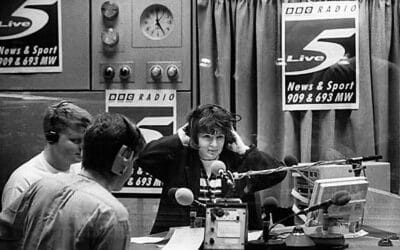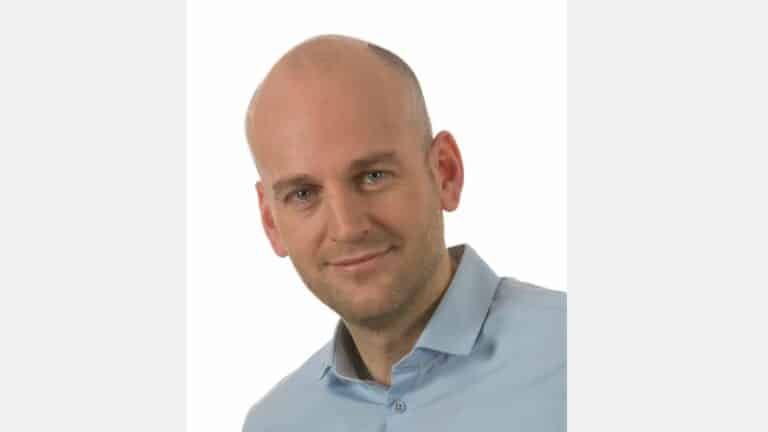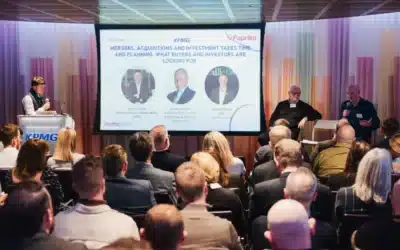Richard Maddock is BBC Radio 5 Live’s Lead Commissioning Editor, based at MediaCity. He joined the BBC in 2013 after more than 20 years in commercial radio at Bauer Media.
In his role, Maddock oversees all the commissions at 5 Live and 5 Sports Extra, including live radio shows and a slate of over 50 podcasts, working with independent production companies and in house BBC departments. 5 Live and 5 Sports Extra has a combined audience of over 6 million listeners a week, with 5 Live celebrating its 30th birthday this month.
As part of a special takeover of our regular features this week to mark the 30th anniversary of BBC Radio 5 Live, Maddock shares his career journey, tips and words of advice…
How did you first get into your industry?
It was a real ‘sliding doors’ moment that could have gone two very different ways. I was on a night-school course and happened to walk past a ringing telephone in one of the lecturers offices. Nobody was around so I answered the phone. The news editor at Radio City in Liverpool was on the other end and he asked if there was anyone at the college who was an experienced radio producer who could edit a programme in the studio the following week as it was the general election.
Despite never having been in a radio station before and certainly having no idea what an editor actually was, I suggested there was someone who was perfect for the job, and his name was Richard Maddock! To cut a long story short, after a week of torment deciding whether or not to go through with it, I turned up on the day with a plan to see how long I’d last. Luckily, I was left doing a job that I managed to do, and they forgot I was there. I kept my head down for 8 hours and before I knew it the programme was over. I’d got away with it and they were very apologetic that they hadn’t used me “to my full capacity”.
Then there was one final twist, on my way out I left my coat behind the chair, giving me a reason to return the next day to collect it. I did exactly that, then returned the next day, and the next day and the next day until I became the ‘work experience guy’. I offered to help anyone who needed a hand, from cleaning the basement, to delivering leaflets. Fast-forward 15 years… and I was the managing director!
What do you love about your job?
Being surrounded by creative broadcasters who have the opportunity to connect with people in so many different ways. When you hear a lonely listener reaching out to a radio programme for company or a shoulder to cry on, or someone who really needs help, it brings home the power of live radio. It connects with people in a way no other media can. It changes lives, brings people together and holds people to account everyday.
Who – or what – has inspired you in your career?
Having been in radio over 30 years, I’ve met many extraordinary people – presenters who can engage with audiences in truly unique ways, creatives who can turn 10 seconds of dead-air into a piece of audio that will be talked about for years and programming teams who can take something ‘ordinary’ and make it unbelievable. But the biggest inspiration comes from the listeners who contact the stations. They share the most personal stories about themselves and it makes you realise just how important that show, or presenter, or radio station is to them. It could be the only interaction they have with another human voice that day, and that’s a real privilege.
What are the biggest challenges about your job?
The biggest challenge is also the biggest opportunity, and that is just not knowing what news event, or sudden occurrence is going to dictate what we do on air that day. As a 24 hour news and sport station we often have to rip up the running order with no notice and literally take each minute as it comes. That scenario is as much invigorating and exciting as it is terrifying.
What skills have been the most crucial to you succeeding in your career so far?
Being able to understand how creative people work and how you can help them be the best that they can be has always been the crux of how I see my role. You sometimes need pretty thick skin in the media and resilience and it isn’t a 9 to 5 job. Flexibility, being able to think outside the box and also being brave enough to try things that might not work are also all pretty crucial.
What was your first salary and what could someone getting into the industry expect to earn nowadays?
I think it was about £3 an hour for being part of a promo team – helping out at launch events, station club nights and client events. What people can earn now varies massively on the role and the sector, but what you do need is patience. Being a presenter, journalist or manager at a radio station isn’t a job that you’re going to walk into and become rich over-night.
What education or training would be most useful for someone looking to follow your career path?
For certain roles at the radio station, such as being a journalist, there are formal qualifications that you need and recognised training in things like media law etc. However, for lots of other roles it is far more important to get as much experience as you can on the job. I often meet people who said they would have loved to have worked on the radio, but never knew where to start or how to get into the industry. Now, with the internet, podcasts, hospital radio or community stations, there are so many different avenues in to broadcasting. Personally, I always look at what experience someone has ahead of what grades they have got.
What advice would you have for someone looking to follow your path?
When anyone asks me about how hard it is to get into radio, I show them the 37 rejection letters that I still have from when I was trying to get a break. Radio is such a special medium that connects with people in such a unique way, but sometimes it isn’t easy to get that first opportunity. Find ways to get involved in any sort of broadcasting at any level. Create your own station in your bedroom, record a podcast on your phone, go and collect requests for your local hospital station, just being in and around a broadcast environment will teach you so much. If someone says no, then ask someone else, and keep knocking on as many doors as you can. Be persistent, be proactive and pick up any ringing phone you happen to walk past!














